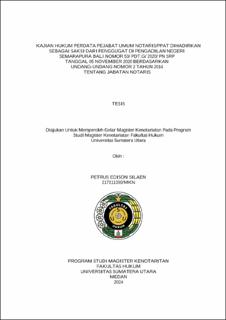| dc.description.abstract | [3.40 PM, 2/8/2024] +62 857-8331-9488: Notary/PPAT can be a plaintiff's witness if, in his position, he knows the real incidence of the dispute, ad it is outside of his position as a Notary/PPAT. The research problems are as follows: how about the presence of a Notary/PPAT as a plaintiff's witness according to the Civil Law and Law No. 2/2014 on the Amendment of Law No. 30/2004 on Notarial Position. The implementation of Article 66 of Law No. 2/2014 in judicial practice of the Semarapura District Court, Bali, No. 53/Pdt.G/2020/PN.SRP. The function of a Notary/PPAT is to give explanation as the witness in the Court.
The research used juridical normative and juridical sociological approaches with descriptive analytical method. The data consisted of primary ad secondary data. They were gathered by conducting library research and field research. The gathered data were analyzed by using qualitative method.
The presence of Notary/PPAT as a plaintiff's witness is based on the civil law and Law on the Position of Notary/PPAT. However, a Notary/PPAT who is asked by his client to be a plaintiff's witness in the civil hearing can refuse it due to right of objection in Article 16. paragraph 1, letter f. Article 54 and Article 66 of Law No. 2/2014 on the Amendment of Law No. 30/2004 on Notarial Position which become legal ground for implementing the right and obligation of the right of objection of Notary/PPAT. The implementation of Article 66 of Law No. 2/2014 on judicial practice in the Semarapura District Court, Bali, is in accordance with the Verdict No. 53/Pdt.G/2020/PN.SRP on November 5/2020. MKN (Notarial Honorary Council), in Article 66, paragraph 1 of UUJN (Notarial Act) is not contrary to the principle of equality before the law. The authority of MKN is functioned as the implementation of legal protection for those who make deeds before a Notary. MKN plays its role in positioning the reality that the Notary/PPAT has ascertained the willingness of those who make authentic deeds
correctly and is in accordance with the applicable procedure. The function of a
Notary/PPAT is giving juridical explanation as a witness before the court.
However, his witness cannot disclose the deeds he has made, either partially or
completely to other people. This is in accordance with Article 54 of UUN
because, as a confidant, a Notary/PPAT is required to keep the secret anything he has heard in his position as a Notary/PPAT. | en_US |


